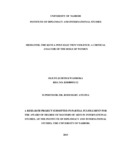| dc.description.abstract | In Kenya, the phenomenon of ethnic- related conflicts seem to be frequent. As such, women leaders have a call to understand mediation as an approach to building peace and fostering reconciliation in the society. Women‘s mediatory roles, though at the informal levels have played a critical role as blueprints for negotiations. This results from the competence of women in handling rebel factions and other parties in conflict. This has in most cases set the pace for formal negotiations recognized by regional and international organizations such as ECOWAS and the United Nations. In recent times, the emerging roles of women at the national and global levels have widened the scope of the participation they assume in mediation teams. Existing studies into peace building and reconciliation have shown how ineffective methodology can precipitate occurrence and resurgence of ethnic conflicts. Further ineffective methods of peace building and reconciliation may result from exclusion of people‘s lifestyles and worldviews such as, rituals and customs and lack of complementarities. This study seeks to evaluate the actual role played by women in mediating the post-election conflict in Kenya in 2007-2008; assess the challenges faced by women in mediation during the PEV in Kenya and establish how the views of women can be rigorously integrated in negotiation and peace processes. The study was guided by the feminist perspective of international relations which entailed mutual combination of factors used by women, political actors and civil society in dealing with the conflict cycle from the structural causes of the struggle to its resolution and the assurance of a peaceful living together. Data for this study was obtained from primary and secondary sources. The sample size for the study will be 50 prominent personalities who were involved in the mediation process following the Kenyan post-election violence. The data was obtained by conducting a field research, using questionnaires, interviews and Focus Group Discussions. Guided by the objectives and premises of the study, the data was analysed and arranged according to the major themes highlighting the role played by women in mediation. The findings of the study will provide evidence for effective use of the abilities held by women in achieving peace in future conflicts. The findings will provide a critical model of how women can be able to work against many odds in major conflicts to ensure that peace is achieved. The study also found out that complementary approach to peace building and reconciliation is inevitable for long lasting peace. In a multi-ethnic society, all actors should ensure they use a comprehensive approach that appreciates the diversity of cultural world views. After the interpretation and discussion of the data, conclusions were drawn and recommendations for further research given. | en_US |

